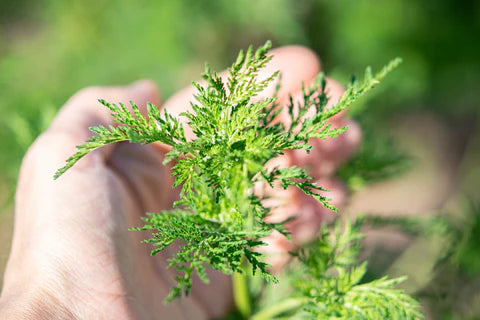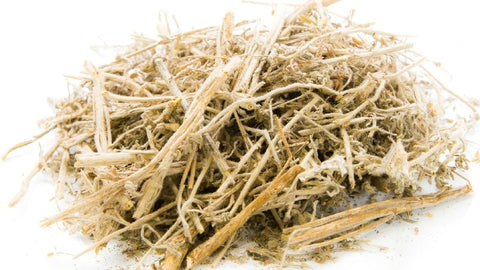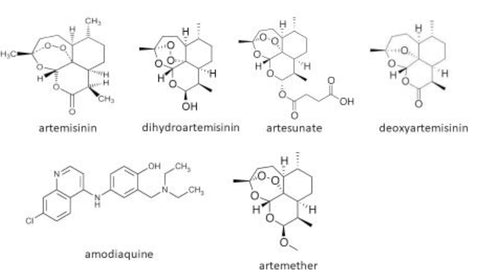Unlocking the power of Artemisia Annua (Sweet Wormwood): Insights from Recent Research
Over the centuries, medicinal herbs have been used as treatment and as a preventive strategy for several diseases, including respiratory and viral infections. The benefit of using these herbs in viral respiratory infections is mainly due to their immune stimulating and inflammation modulating effects. The WHO has estimated that about 65–80% of the world’s healthcare involves the use of traditional medicine to treat infectious diseases. Several studies carried out on plants and their derived products have helped develop effective antibiotic and antiviral treatments (1).
Sweet Wormwood, (botanical name: Artemisia annua), which has been known since ancient times as a healing herb, has long intrigued researchers and healers due to its antimalarial properties. Artemisinin is the active compound extracted from the plant that kill the parasite that causes malaria (1). It earned its inventor, Tu Youyou, a Chinese scientist, a noble prize in medicine back in 1970 (11).
The broad-spectrum antiviral potential of Artemisia metabolites against a wide range of DNA and RNA viruses prompted some researchers to investigate whether they could be used to combat COVID-19 (1)

There are around 500 species of Artemisia (8). This article focuses on Artemisia Annua, known as Sweet wormwood, Sweet annie, Sweet sagewort, Annual wormwood, Qinghao, and Annual mugwort. It grows in zones 5-9 in the United States reaching 6 ft. tall, 2ft. wide at full maturity. It has juicy green leaves about 3 to 5 cm long and rarely flowers. the plant has a sweet-smelling, silvery-green, lacy foliage. This medicinal plant is a native of Europe and Asia. it readily self-seeds, making this beautiful smelling plant reappear year after year (2).
Medicinal Benefits of Sweet Wormwood
The Artemisia annua plant has been used for over 2,000 years to treat a variety of fever-related ailments, including malaria, bacterial infections, illnesses caused by parasites, fungal infections and viral infections such as the common cold (4). It has also been used for inflammation, pain due to arthritis or headaches (7). This plant has been employed to treat malaria in Traditional Chinese Medicine and in many African countries (1,7).
Artemisia annua is related to other species in the artemisia family that have medicinal properties, such as Artemisia vulgaris or mugwort and Artemisia absinthium, herbs primarily used to fight parasites. The Artemisia annua plant produces the antimalarial compound artemisinin that is stored in the leaves and flowers of the plant (4). Artemisinin beneficial sesquiterpene derivatives artesunate and artemether are the key active pharmaceutical ingredients of front-line anti-malaria combination therapies (3,5). Derivatives of the herb are under further investigations to reveal more about their potential as an anti-cancer drug (11).
Artemisia Annua Compounds
Artemisinin delivered directly from the consumption of A. annua leaf powder is highly bioavailable and distributes through peripheral blood and into a plethora of organs including lungs, liver, heart, and brain (3).
The artemisia annua plant’s stems, leaves and flowers are used to make several types of medicines, including oral artesunate extracts and topical ointments, as well as natural remedies, such as artemisia annua tea (8). The leaves and thin stem of the plants are dried and powdered to form colorless crystals to get the required extract (11)

Some researchers believe that artemisia annua plant extracts and artemisinin derivatives (artemisin, artesunate, and artemeter) may naturally help treat viruses, however at this time it isn’t widely used in this capacity as its efficacy is still being examined. Below you can read about of two studies published in 2021 and on-going trials at WHO.
Sweet Wormwood Plant Extract Research
In 2021, a team of researchers from the Worcester Polytechnic Institute, Columbia University, and the University of Washington, found that extracts from the leaves of the Artemisia annua plant inhibit the replication of the SARS-CoV-2 virus and two of its earlier variants (3). The in vitro findings led researchers to suggest that one or more compounds in Artemisia annua may point to a safe, low-cost therapeutic therapies (3).
Dried leaves of A. annua, obtained from four continents were soaked in hot water and tested the solutions against SARS-CoV-2 and two variants originating from the United Kingdom and South Africa. Some leaf samples were 12 years old but still potent against the virus. Researchers also tested artemisinin alone against the viruses, but the plant extracts were more potent. Although Artemisinin is a compound naturally produced by the plant, it is usually extracted, chemically modified, and developed in combination with other drugs to treat malaria.
Results of the study showed that the extracts of A. annua did not block the virus from entering cells but interfered with the virus’ ability to replicate, thus killing it. In addition, the anti-replication activity did not appear linked to artemisinin or flavonoids, which are natural substances in the plants. (3)
Since Artemisia annua has compounds that inhibit inflammation and the formation of scar-like tissues known as fibrosis, the researchers also believed that these characteristics pointed to a plant that bears a lot more study.
The work was described in an article published in the Journal of Ethnopharmacology.
Research on Sweet Wormwood Plant Extract and its Derivatives
Artemisinin-based drugs would be attractive repurposing candidates for treatment of COVID-19 considering their excellent safety profiles in humans, and since they are readily available for worldwide distribution at a relatively low cost (1).
Since A. annua extracts are active against different viruses, including SARS-CoV, these researchers were set to determine whether A. annua extracts, as well as pure artemisinin, artesunate, and artemether were active against SARS-CoV-2 in vitro. (1)
The study published in 2021, reports in vitro efficacy of Artemisia annua extracts as well as artemisinin, artesunate, and artemether against SARS-CoV-2. The latter two are approved active pharmaceutical ingredients of anti-malarial drugs. The treatment with all studied extracts and compounds inhibited SARS-CoV-2 infection of VeroE6 cells, human hepatoma Huh7.5 cells and human lung cancer A549-hACE2 cells, without obvious influence of the cell type on antiviral efficacy. In treatment assays, artesunate proved most potent followed by artemether, Artemisia Annua extracts and lastly artemisinin. Clinical studies are required to further evaluate the utility of these compounds as COVID-19 treatment.(1)
The work was described in this article published by Scientific Reports on July 16, 2021
Covid-19 Global Solidarity Trial: Artesunate
The WHO COVID-19 Therapeutics Advisory Group recommended evaluating the anti-inflammatory properties of artesunate, a derivative of artemisinin, so this compound became part of the solidarity plus trial; a global platform trial that represents the largest global collaboration among WHO member states.
This large, global randomized control trial is designed to provide robust results on whether a drug can save lives in those hospitalized with severe or critical COVID-19. In this trial Artesunate will be administered for 7 days, using the standard dose recommended for the treatment of severe malaria. (1)
Safety Considerations
Before using the herb, topically or internally, it is highly recommended to take an advice from an experienced medical practitioner and adhere to the dosage prescribed (11).
The herb can do more harm than good if it is consumed by a woman in the first trimester of pregnancy. In general, avoid during pregnancy. Artemisia is not recommended for the lactating mothers either (7, 9, 11).
Could interefere with antacids, sucralfate, proton pump inhibitors, and histamine-receptor antagonists because it increases the production of stomach acid. Can induce seizures resulting in decreased efficacy of anti-seizure medications (9, 11)
Artemisia may affect the absorption of the anti-diabetic drugs, which may lead to hypoglycemia. Therefore, blood glucose level should be regularly checked and dosage should be adjusted accordingly (11).
The prolonged usage of Artemisia herb must be avoided as it may cause side effects like Nausea, dizziness, and fatigue. An unattended excessive dose of this herb may also lead to neurotoxicity (11)
The use of the whole herb as well as artemisinin may cause upset stomach, loose stools, abdominal pain, and occasional fever (10).
Artemisinin should not be used alone in malaria.The underlying reason is that the dosage of dried aerial parts of the Artemisia Annua does not contain a significant quantity of Artemisinin, which can lead to treatment failure by developing drug resistance (7, 11).
Main Indications
Internal Uses (11)
- Malaria
- Fevers due to bacterial infections
- Common cold
- Dysentery and diarrhea
- Intestinal worms
- Fungal infections
- Upset stomach
- Jaundice and Hepatitis
- Systemic Lupus Erythematosus (SLE)
- Psoriasis
- Eczema
- Scabies
- Constipation
- Loss of appetite
- Abdominal Pain
- Autoimmune Disorders
- Dysmenorrhea (Painful Menstruation)
- Joint Pain (Rheumatism)
- Anorexia
- Gallbladder disorders
- Night sweats
- Secondary infections in AIDS
- Local Application
Topical uses (11).
- Skin infections
- Bruises
- Sprains
- Joint pain (arthritis)
- Nerve pain
Bibliography
- https://www.sciencedirect.com/science/article/pii/S0753332223014804?ref=pdf_download&fr=RR-2&rr=81b47de3bcac3880
- https://www.thespruce.com/sweet-annie-plants-profile-5185432
- https://www.wpi.edu/news/early-research-finds-extracts-sweet-wormwood-plant-can-inhibit-covid-19-virus
- https://www.rxlist.com/supplements/sweet_annie.htm
- https://www.sciencedirect.com/science/article/pii/S0753332223014804?ref=pdf_download&fr=RR-2&rr=81b47de3bcac3880
- https://www.who.int/emergencies/diseases/novel-coronavirus-2019/global-research-on-novel-coronavirus-2019-ncov/solidarity-clinical-trial-for-covid-19-treatments
- https://draxe.com/nutrition/artemisia-annua-benefits/
- https://artemisia-shop.de/en/blogs/artemisia/artemisia-annua-und-artemisia-vulgaris-was-ist-der-unterschied#:~:text=The%20main%20difference%20between%20common,cm%20long%20and%20rarely%20flowers.
- https://thenaturopathicherbalist.com/herbs/a-2/artemisia-annua/
- https://publix.aisle7.net/publix/us/assets/nutritional-supplement/sweet-annie/side-effects
- https://www.ayurtimes.com/sweet-wormwood-artemisia-annua-sweet-annie/



